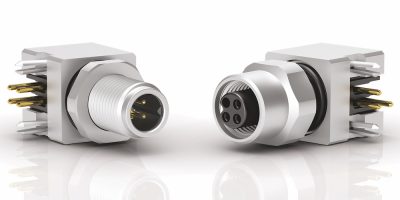M5 angled panel mount connectors are compact enough for UAVs
M5 angled panel mount parts from binder support designers in space-critical applications in automation, robotics, metrology and controls.
binder offers three- or four-pin angled panel mount parts in the 707 series in size M5. They are equipped with dip solder contacts for PCB mounting, and have screw locking to ensure reliable connections. Mated and locked, the interface complies with IP 68, said binder.
They are suitable for the expanding unmanned aerial vehicles (UAVs) and collaborative robots, as well as for machine vision cameras and linear encoders which need compact interfaces for signal transmission. In these applications, systems are highly specialised and individually tailored and also require maximum reliability. Electromechanical interconnects are expected to be flexible and robust. The space-saving M5 angled panel mount parts are equipped with slightly splayed positioning pins. Hardly visible to the naked eye, these ensure the best possible protection against twisting on the PCB even before the contacts are soldered, said binder. They also have a deeper O-ring that seals the interface against the housing. When the panel mount parts are connected, the O-ring is pressed against the housing as far as the stop, optimising the seal. Destruction of the seal by overtightening is basically impossible, said binder.
The M5 angled panel mount parts measure only 7.5mm in width. This is significantly less than the usual dimensions for connectors, said the company, making it practical for use in confined spaces.
The 707 series angled flange connectors from binder are rated to 60V and 1A and withstand impulse voltages of up to 1.5kV. The brass contacts are plated in gold. Both the housing and the screw locking threaded ring are made of brass and the contact body is made of liquid crystal polymer (LCP). In accordance to IP 68, the interface is protected against dust and permanent immersion (1.8 bar for 24 hours) in water. Operating temperature range is between -25 and +85 degrees C. Mechanical lifespan is more than 100 mating cycles.




